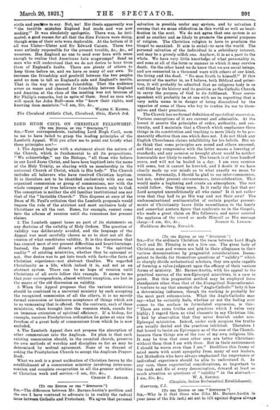(To me Eamon or raa " Sezostsos."l
Sm.—The difference between Mr. Barnes-Austin's position and the one I have ventured to advocate is in reality the, radical issue between Catholic and Protestant. We agree that personal salvation is possible under any system, and by salvation I assume that we mean edification in. this world as well as beati- fication in the next. We do not agree that one system is as good as another and as likely to promote the general purposes of religion. The Christian religion is here to proclaim the Gospel to mankind. It aim is social—to save the world. The personal salvation of the individual is a subsidiary interest, and may be a grossly selfish one. Anyhow, it is as a part to the whole. We have very little knowledge of what personality is, and none at all of the form or manner in which it may survive death. On the other hand we do know that we are social beings, and are connected in a thousand ways with others of our kind, the living,and the-dead. "No man liveth to himself." If this accoant of the matter is, as I believe, both Biblical and primi- tive, it will probably be admitted that no religious body is so well fitted by its history and its position as the Catholic Church to carry the purpose of God to its fulfilment. Your corre- spondent will probably be at one with me in regretting that a very noble name is in danger of being discredited by the vagaries of some of those who try to confine its use to them- selves and their practices.
The Church has no formal definition of apostolical succession. Various conceptions of it are current and admissible. At the lowest it asserts the principles of order, authority, and con- tinuity, and I maintain that a Church which emphasizes these things in its constitution and teaching is more likely to be per- manently effective than one which does not. I do not think any English Churchman claims infallibility for his beliefs. But we do think that some principles are sound and others unsound, and that any compromise with the latter means a lowering of standards, and any reunion so brought about would be neither honourable nor likely to endure. The breach is of four hundred years, and will not be healed in a day. I am sure reunion will come, but it cannot be hurried, and I doubt if we have clearly made up our minds as to what exactly we mean by reunion. Personally, I should be glad to see inter-communion, but not, under present circumstances, inter-celebration. That would make a beginning and create an atmosphere. The rest would follow. One thing more. Is it really the fact that our Lord accepted unconditionally all who came? Is it not rather true that they had to go His way and not their own? The undenominational sentimentalist of certain popular present- ments of Christianity bears little resemblance to the lonely and somewhat austere figure that confronts us in the Gospels, who made a great claim on His followers, and never courted the applause of the crowd or made Himself or His message


































 Previous page
Previous page